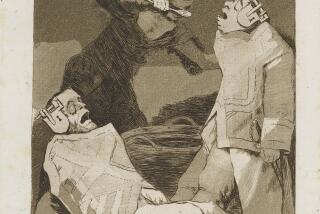Guccione’s ‘Hearing Voices’ Surreal <i> Film Noir</i> at LACE
- Share via
Imagine a surreal film noir version of the ordeal of Joan of Arc, and you’ll have a rough idea of what Michael Guccione’s “Hearing Voices” (a Filmforum presentation tonight at 8 at Los Angeles Contemporary Exhibitions) is like. Guccione’s unstable heroine (Gloria Casey), who from time to time hears voices, has apparent underworld connections. Her life starts unraveling when she begins a romance with a nightclub owner to whom she has sold a car through a classified ad; the time seems to be the McCarthy Era of anti-Communist hysteria.
“Hearing Voices,” which is by far the most accessible of the three Guccione films that constitute tonight’s program, reveals its maker to be original and quirky, a creator of strong, often disturbing images that are often difficult to connect with one another. Guccione is the kind of experimentalist whose talent is lots clearer than his meanings. Don’t expect to be able to comprehend all that he describes in such helpful detail in his press material. Information: (213) 663-9568.
Frunze Doviatian’s great--and grueling--”The Yearning” (at the Nuart Friday through next Monday) is at once a profound expression of a displaced person’s longing for his homeland and an impassioned, unsparing indictment of the evils of Stalinism.
In a towering, majestic portrayal, Rafael Atoyan plays a rugged, bearded Armenian peasant in his mid-60s who faces relentless interrogation by Soviet officers who cannot comprehend that he has visited his birthplace (now on the Turkish side of the border) because of an overpowering desire to get back to his roots. They believe he almost surely must be a spy for the British or, at the very least, a deserter.
As the relentless interrogation proceeds, Doviatian begins a series of flashbacks. The most important is the peasant’s actual visit, an experience that is deeply spiritual, even mystical. Atoyan’s peasant emerges not only as a symbol of Armenia but of displaced and oppressed people everywhere.
“The Yearning” is long--140 minutes--and hard to take, but is one of the finest films shown in Los Angeles this year. Information: (310) 478-6379.
For its latest Out on the Screen presentation, the Gay & Lesbian Media Coalition is joining forces with the United Lesbians of African Heritage, the Southern California Rainbow Society of the Deaf, the Gay & Lesbian Community Services Center’s Outreach & Education Project and the Bienestar Latino AIDS Project to present a weekend of screenings at the Vista Theater.
Screening Friday at 7:30 p.m. is Pratibha Parmar’s lively, crackling “A Place of Rage,” which documents the impassioned words and deeds of Angela Davis, poet-essayist June Jordan, novelist Alice Walker and filmmaker Trinh T. Minha.
At 9:30 p.m., Donna Deitch will present her memorable 1985 lesbian romance “Desert Hearts.”
On Saturday at 7 p.m. Nicole Conn will present her “Claire of the Moon,” a tale of a group of women attending a writers conference. The film gradually overcomes its first-film uncertainties to end up as the best American lesbian drama since “Desert Hearts.”
Jaime Chavarri’s thoroughly entertaining “The Affairs of Love” (“Las Cosas del Querer”), which follows “Claire of the Moon,” is set in Franco’s oppressive Spain of the 1940s. It’s a warm, exuberant show-biz saga with a difference, for the male partner (Manuel Bandera) in a hugely popular singing and dancing duo happens to be gay, and openly so. Information: (213) 650-5133.
Alfonso Cuaron’s “Love in the Time of Hysteria” (1990) and Jaime Humberto Hermosillo’s “Homework” (1990), which screen Sunday at 7:30 p.m. at UCLA’s Melnitz Theater, are among the most audacious films in the UCLA Film Archives’ splendid Contemporary Mexican Cinema series.
Both are wonderfully risque modern-day sex farces. In the first, we meet a handsome young Mexico City advertising copywriter (Daniel Gimenez Cacho), an incorrigible Don Juan, whose doctor routinely prescribes an HIV test with his physical. Suspense quickly generates as Cuaron deftly places a classic screwball comedy in a contemporary context with deadly serious implications.
The second, which is ultra-erotic and concerned with a couple (“Danzon’s” Maria Roja, Jose Alonso) engaged in prolonged lovemaking, amusingly verges on the hard core. “Homework” ends with a contrived surprise twist that seems gratuitous. Information: (310) 206-FILM.
More to Read
The biggest entertainment stories
Get our big stories about Hollywood, film, television, music, arts, culture and more right in your inbox as soon as they publish.
You may occasionally receive promotional content from the Los Angeles Times.










